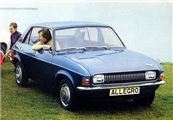Austin Allegro launched
17 May 1973
By Peter Waymark, Motoring Correspondent
A new compact family saloon which could be crucial to the fortunes of British Leyland, Britain's biggest car manufacturer, is announced today. The Austin Allegro has been planned as an eventual successor to the 1100/1300 range, which has been in production since 1962.
With a choice of four engine sizes, 1100, 1300, 1500 and 1750, the Allegro will compete in 60 per cent of the British car market. Leyland is also hoping for substantial sales on the Continent, and assembly is expected to begin soon at the company's plant in Belgium.
The Allegro follows the Mini, 1100 and 1800 tradition of a transverse mounted engine driving the front wheels. A new suspension system based on compressed nitrogen has been introduced to improve ride and handling and another novelty is a squared or "quartic" steering wheel. Compared with the 1100/1300, the Allegro has 40 per cent more boot capacity, more space round the engine, a better driving position and a higher standard of interior trim.
Twelve models have so fat been announced at prices ranging from £974 for the two-door 1100 to £1,367 for the 1750 Sport Special. Leyland hope to be producing 4,000 Allegros a week at their factory at Longbridge, Birmingham, by early next year.
The development of the car has taken four years and represents an investment of £21m.
Railway contract: A five-year contract to transport body components for the Allegro has been won by British Rail's Western Region in competition with road hauliers (the Press Association reports). It is British Rail's first contract to haul car parts in bulk over short distances. Parts from the Austin Morris body works at Swindon, Wiltshire, will be carried to the assembly plant at Longbridge.
More news from the archive
Compare classic car insurance quotes and buy online. A friendly service offering access to a range of policies and benefits.





